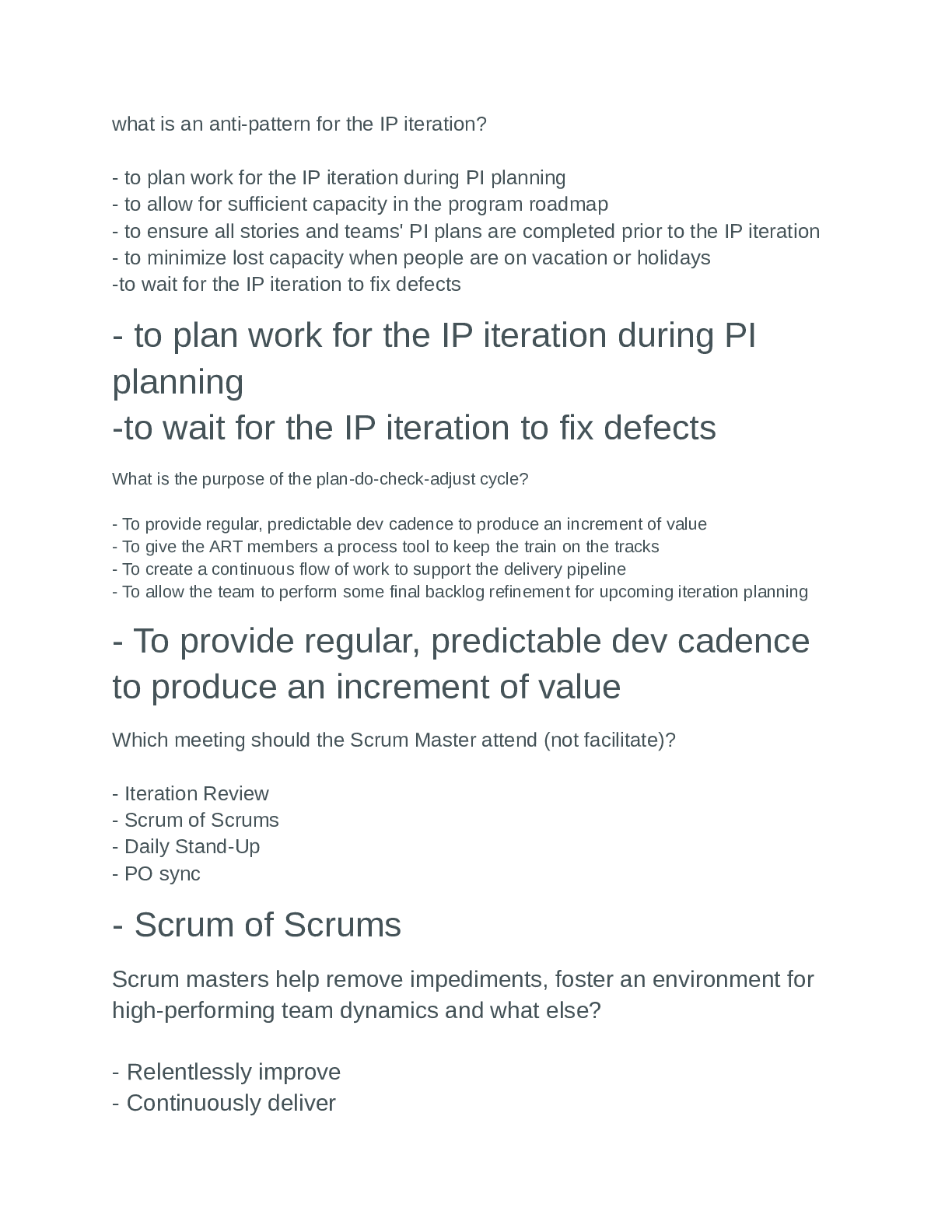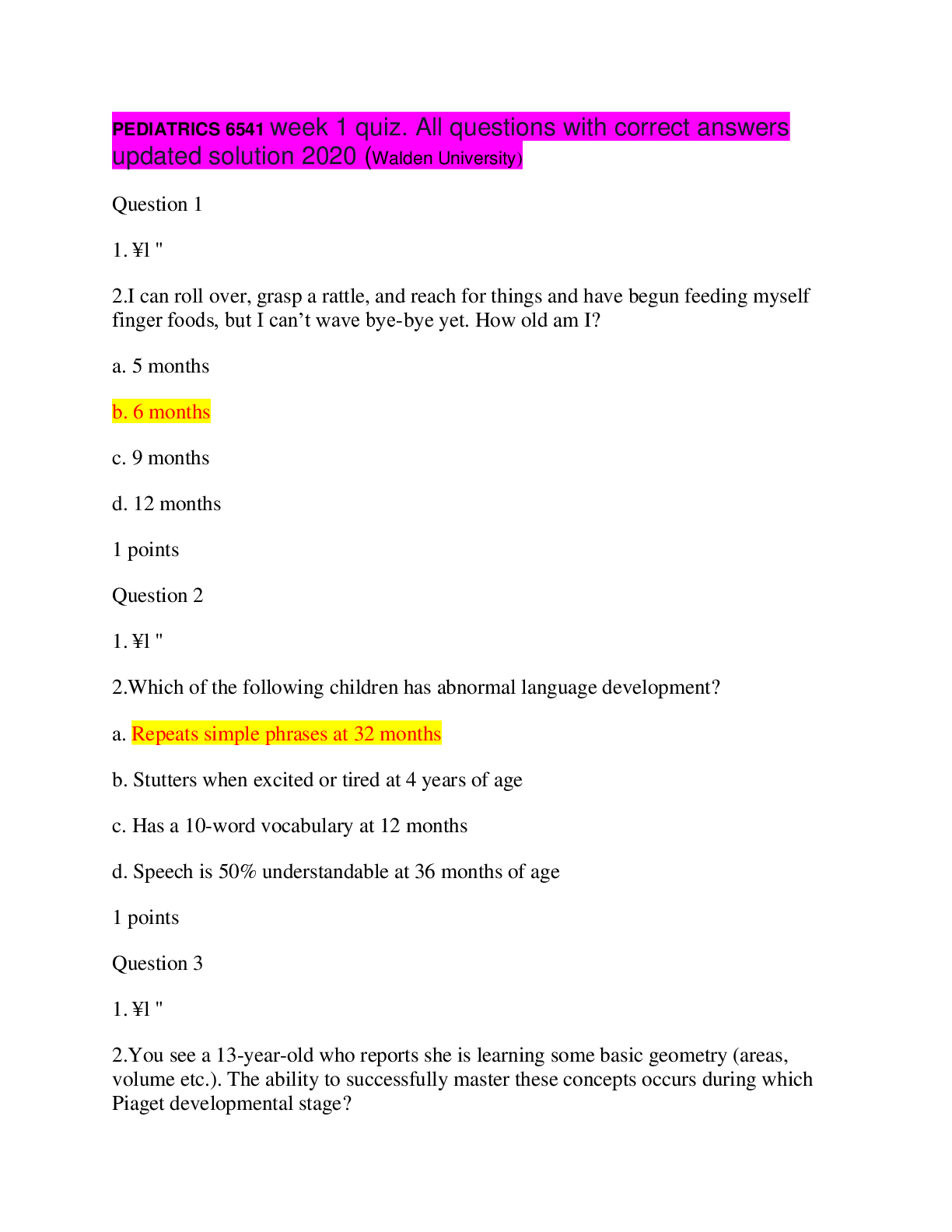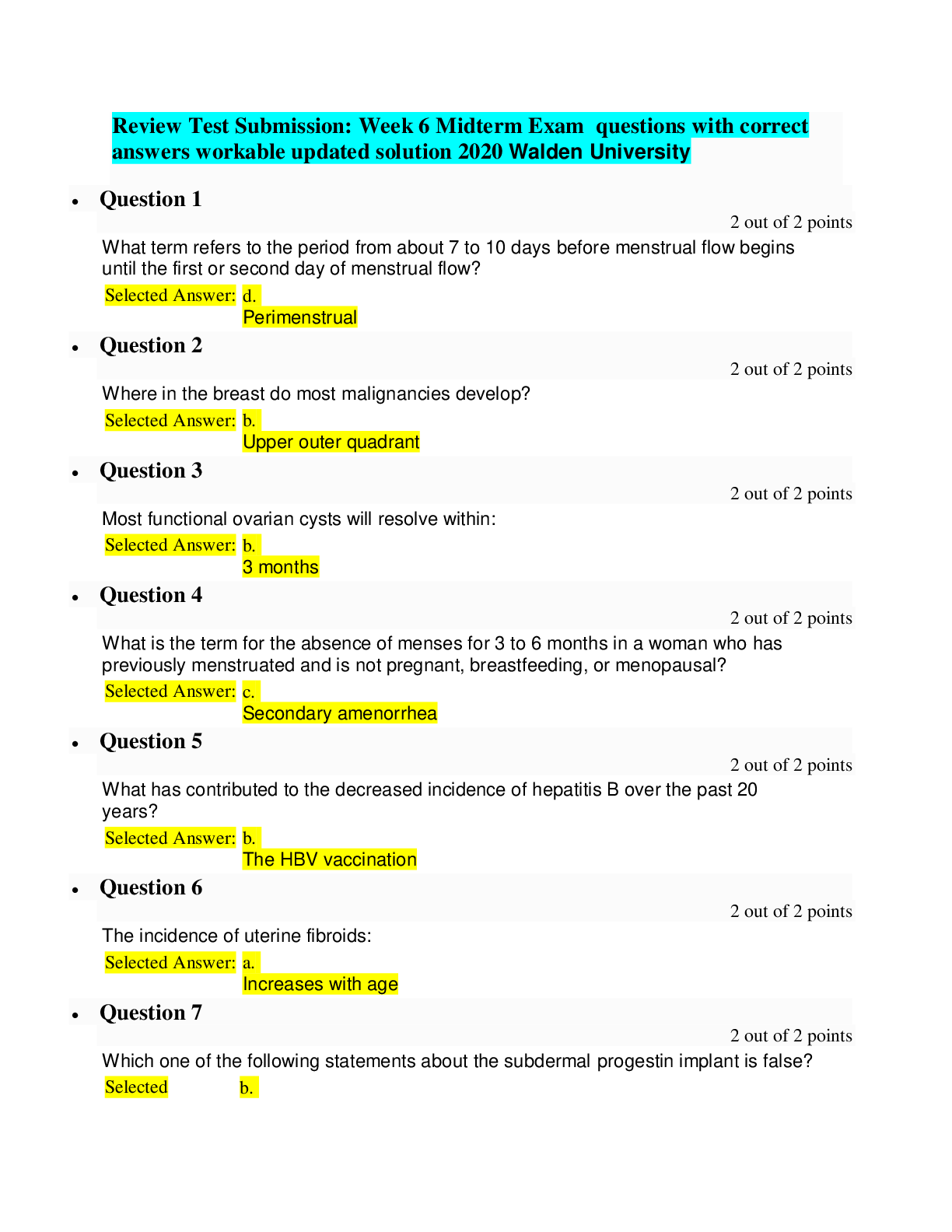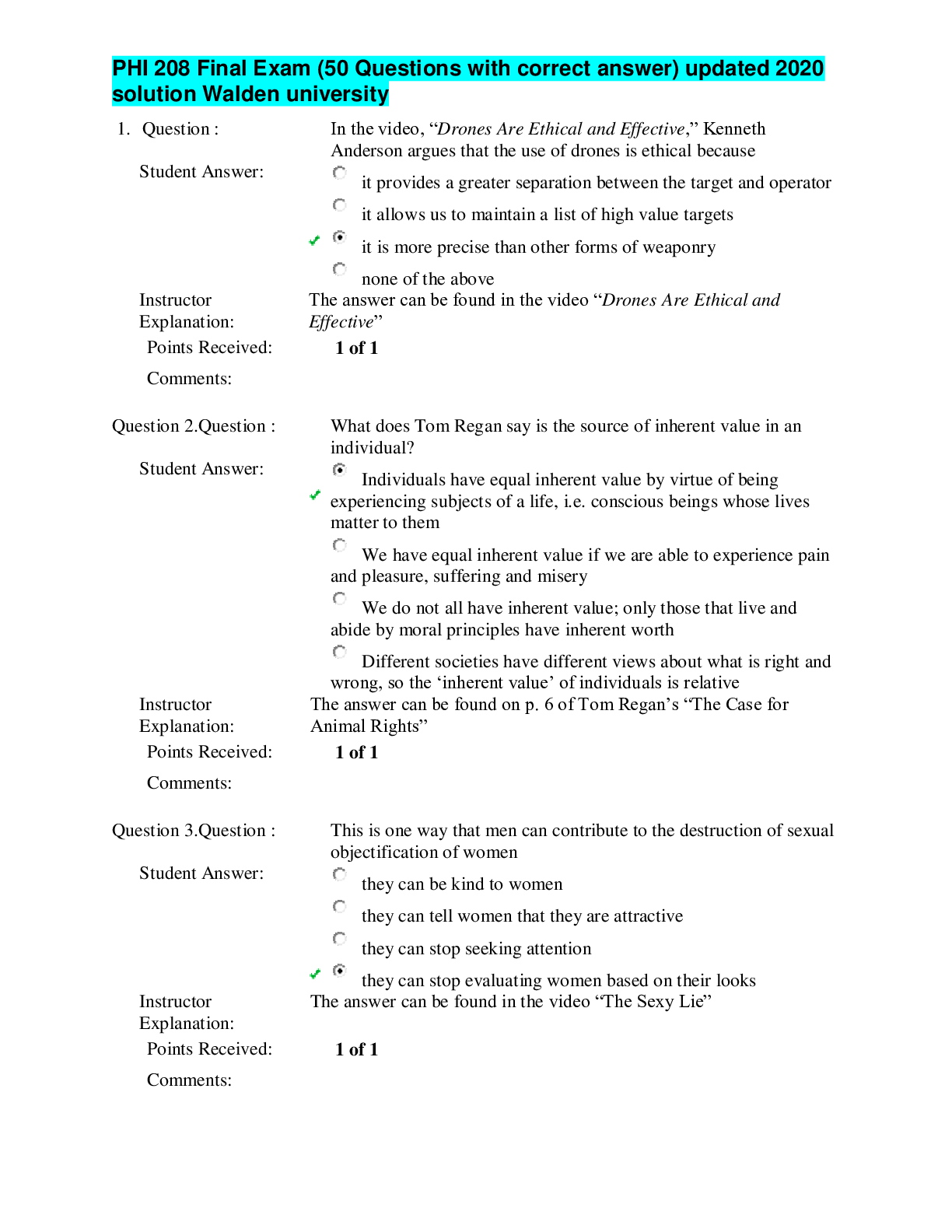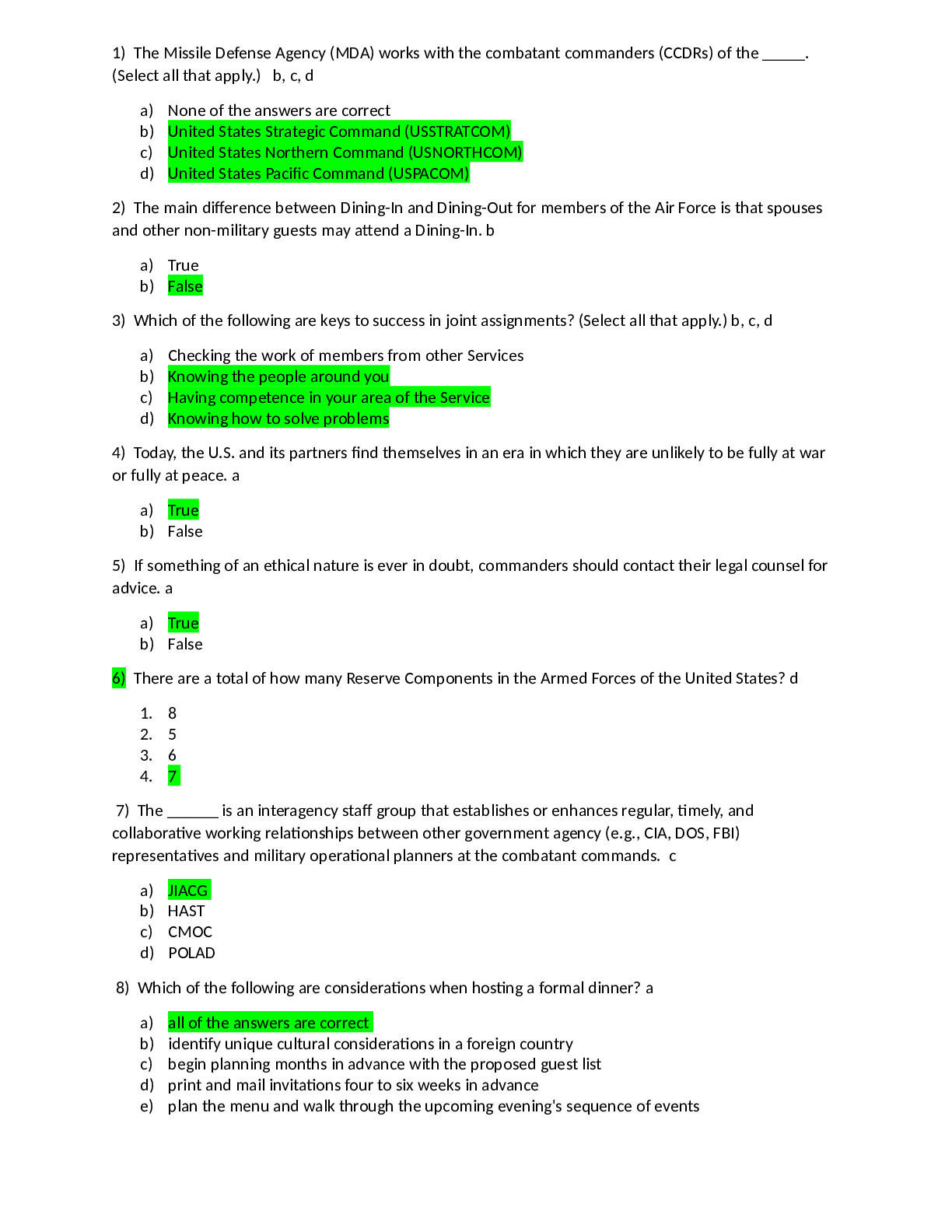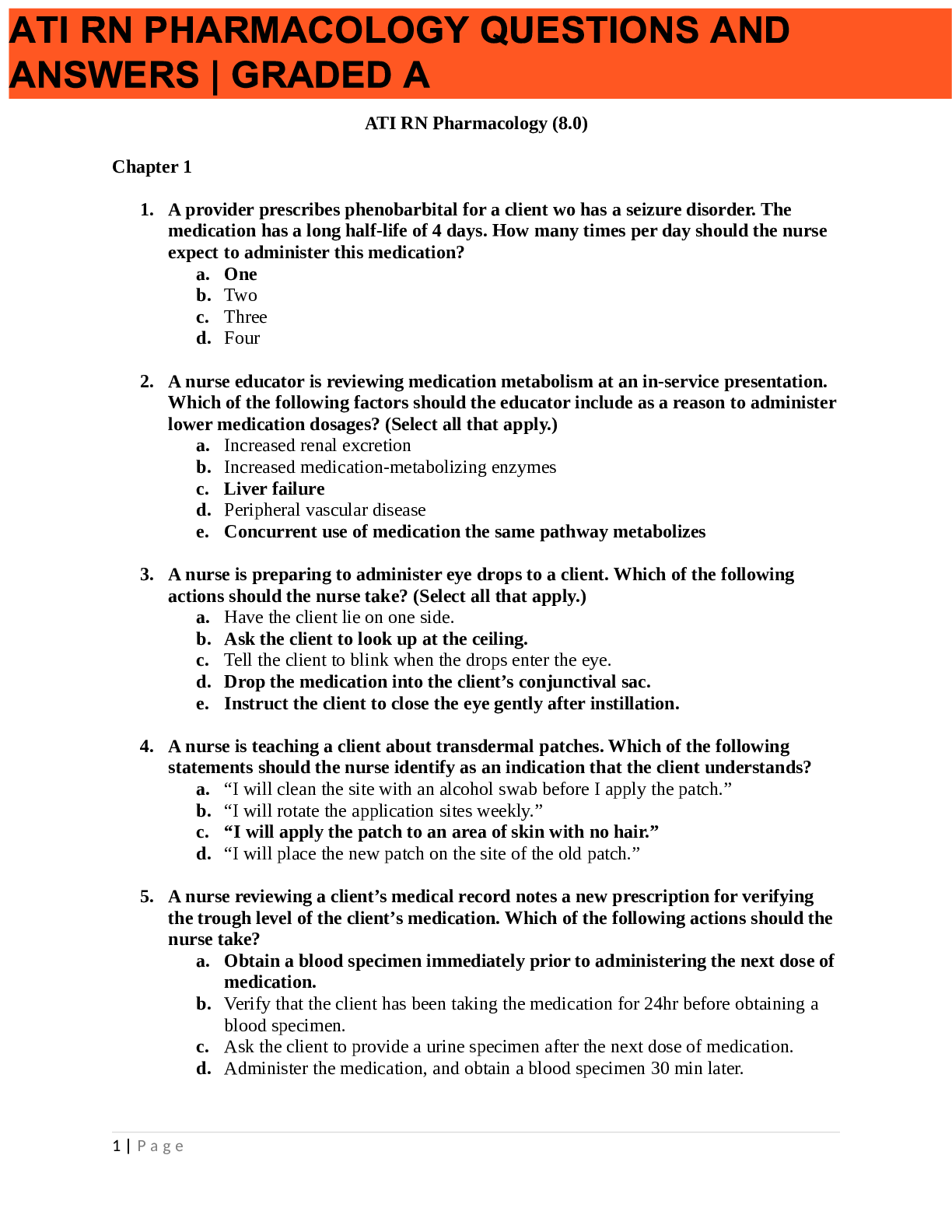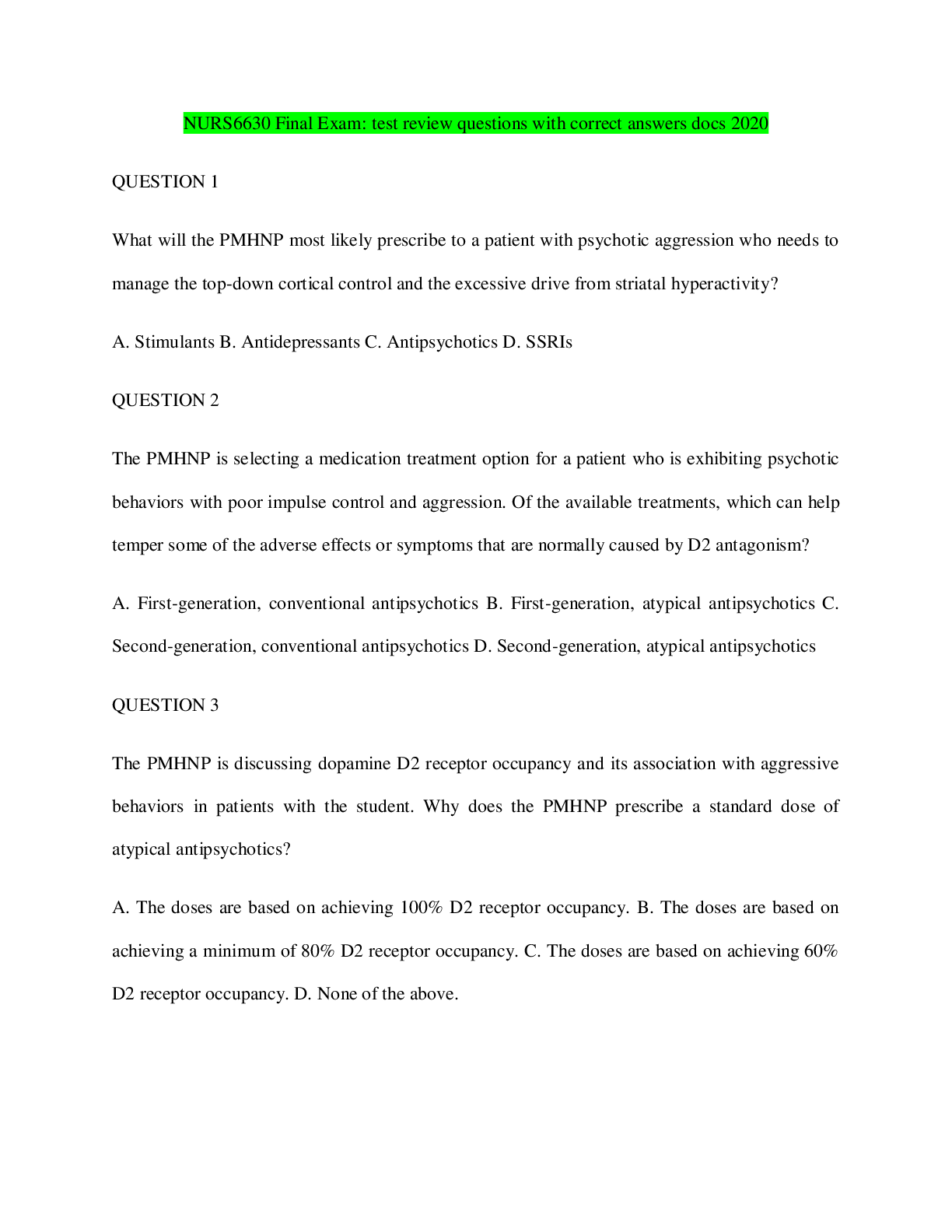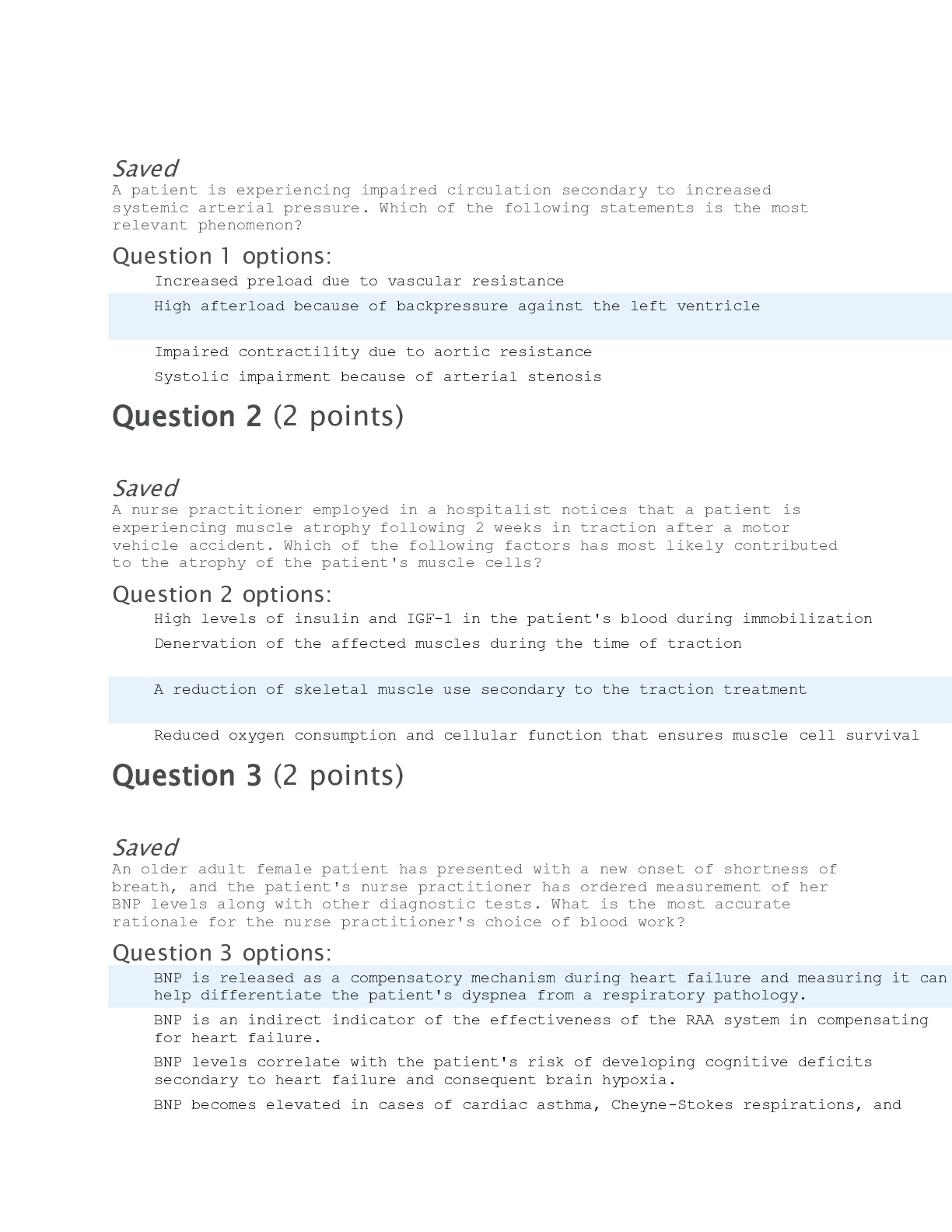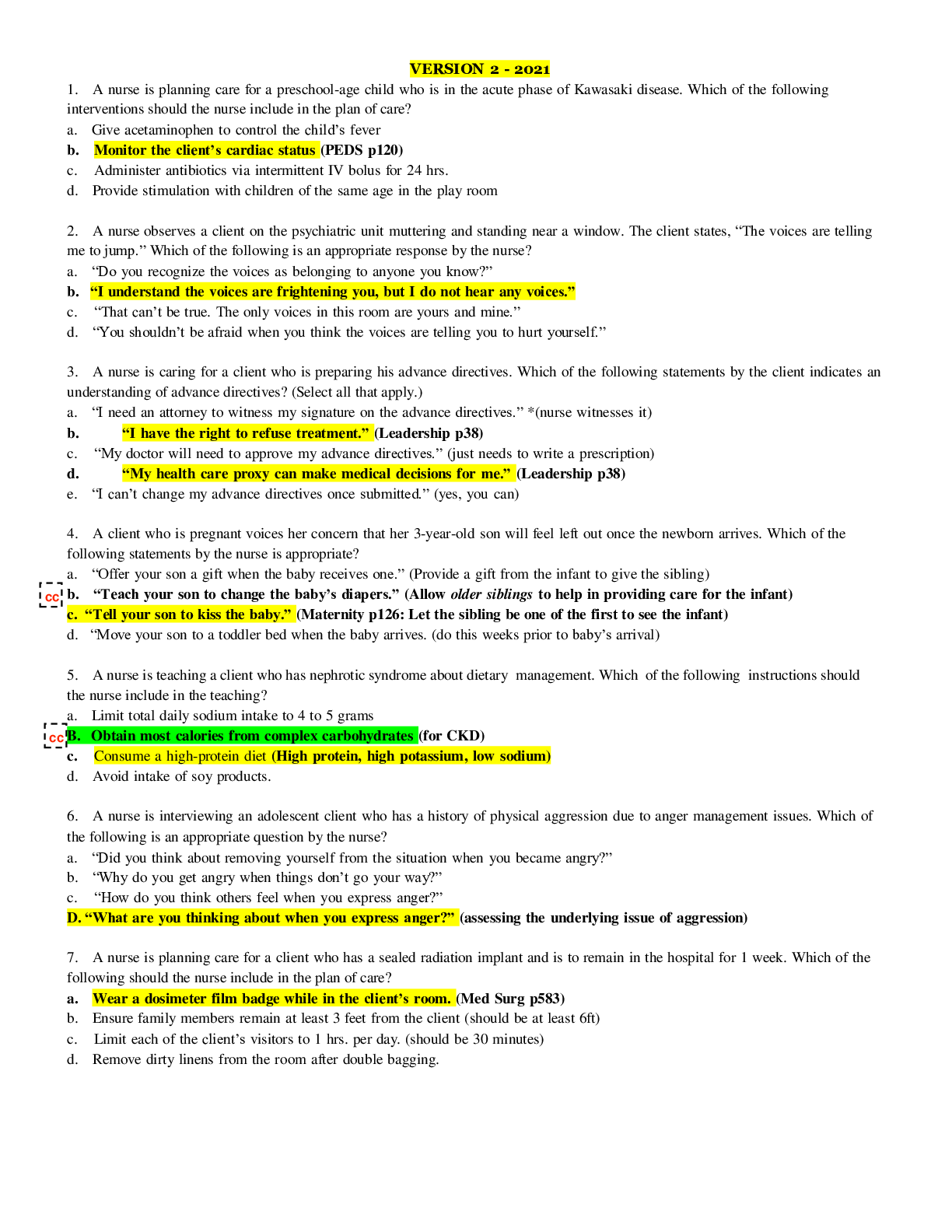*NURSING > QUESTIONS & ANSWERS > NR 508 Week 3 Exam Questions With Correct Answers(already graded A)Kaplan (All)
NR 508 Week 3 Exam Questions With Correct Answers(already graded A)Kaplan
Document Content and Description Below
Angiotensin-converting-enzyme (ACE) inhibitors are a central part of the treatment of heart failure because they have more than one action to address the pathological changes in this disorder. Which ... of the following pathological changes in heart failure is NOT addressed by ACE inhibitors? 1. Changes in the structure of the left ventricle so that it dilates, hypertrophies, and uses energy less efficiently. 2. Reduced formation of cross-bridges so that contractile force decreases. 3. Activation of the sympathetic nervous system that increases heart rate and preload. 4. Decreased renal blood flow that decreases oxygen supply to the kidneys. 3. Activation of the sympathetic nervous system that increases heart rate and preload. One of the three types of heart failure involves systolic dysfunction. Potential causes of this most common form of heart failure include: 1. Myocardial ischemia and injury secondary to myocardial infarction 2. Inadequate relaxation and loss of muscle fiber secondary to valvular dysfunction 3. Increased demands of the heart beyond its ability to adapt secondary to anemia 4. Slower filling rate and elevated systolic pressures secondary to uncontrolled hypertension 1. Myocardial ischemia and injury secondary to myocardial infarction The American Heart Association and the American College of Cardiology have devised a classification system for heart failure that can be used to direct treatment. Patients with symptoms and underlying disease are classified as stage: 1. A 2. B 3. C 4. D 3. C Diagnosis of heart failure cannot be made by symptoms alone because many disorders share the same symptoms. The most specific and sensitive diagnostic test for heart failure is: 1. Chest x-rays that show cephalization and measure heart size 2. Two-dimensional echocardiograms that identify structural anomalies and cardiac dysfunction 3. Complete blood count, blood urea nitrogen, and serum electrolytes that facilitate staging for endorgan damage 4. Measurement of brain natriuretic peptide to distinguish between systolic and diastolic dysfunction 2. Two-dimensional echocardiograms that identify structural anomalies and cardiac dysfunction Treatments for heart failure, including drug therapy, are based on the stages developed by the ACC/AHA. Stage A patients are treated with: 1. Drugs for hypertension and hyperlipidemia, if they exist 2. Lifestyle management including diet, exercise, and smoking cessation only 3. Angiotensin-converting enzyme (ACE) inhibitors to directly affect the heart failure only 4. No drugs are used in this early stage 1. Drugs for hypertension and hyperlipidemia, if they exist Class I recommendations for stage A heart failure include: 1. Aerobic exercise within tolerance levels to prevent the development of heart failure 2. Reduction of sodium intake to less than 2,000 mg/day to prevent fluid retention 3. Beta blockers for all patients regardless of cardiac history 4. Treatment of thyroid disorders, especially if they are associated with tachyarrhythmias 4. Treatment of thyroid disorders, especially if they are associated with tachyarrhythmias Stage B patients should have beta blockers added to their heart failure treatment regimen when: 1. They have an ejection fraction less than 40% 2. They have had a recent MI 3. Both 1 and 2 4. Neither 1 nor 2 3. Both 1 and 2 Increased life expectancy for patients with heart failure has been associated with the use of: 1. ACE inhibitors, especially when started early in the disease process 2. All beta blockers regardless of selectivity 3. Thiazide and loop diuretics 4. Cardiac glycosides 1. ACE inhibitors, especially when started early in the disease process Stage C patients usually require a combination of three to four drugs to manage their heart failure. In addition to ACE inhibitors and beta blockers, diuretics may be added. Which of the following statements about diuretics is NOT true? 1. Diuretics reduce preload associated with fluid retention. 2. Diuretics can be used earlier than stage C when the goal is control of hypertension. 3. Diuretics may produce problems with electrolyte imbalances and abnormal glucose and lipid metabolism. 4. Diuretics from the potassium-sparing class should be used when using an angiotensin receptor blocker (ARB). 4. Diuretics from the potassium-sparing class should be used when using an angiotensin receptor blocker (ARB). Digoxin has a very limited role in treatment of heart failure. It is used mainly for patients with: 1. Ejection fractions above 40% 2. An audible S3 3. Mitral stenosis as a primary cause for heart failure 4. Renal insufficiency 2. An audible S3 Which of the following classes of drugs is contraindicated in heart failure? 1. Nitrates 2. Long-acting dihydropyridines 3. Calcium channel blockers 4. Alpha-beta blockers 3. Calcium channel blockers Heart failure is a leading cause of death and hospitalization in older adults (greater than 65 years old). The drug of choice for this population is: 1. Aldosterone antagonists 2. Eplerenone 3. ACE inhibitors 4. ARBs 3. ACE inhibitors ACE inhibitors are contraindicated in pregnancy. While treatment of heart failure during pregnancy is best done by a specialist, which of the following drug classes is considered to be safe, at least in the later parts of pregnancy? 1. Diuretics 2. ARBs 3. Beta blockers 4. Nitrates 3. Beta blockers Heart failure is a chronic condition that can be adequately managed in primary care. However, consultation with or referral to a cardiologist is appropriate when: 1. Symptoms markedly worsen or the patient becomes hypotensive and has syncope 2. There is evidence of progressive renal insufficiency or failure 3. The patient remains symptomatic on optimal doses of an ACE inhibitor, a beta blocker, and a diuretic 4. Any of the above 4. Any of the above ACE inhibitors are a foundational medication in HF. Which group of patients cannot take them safely? 1. Elderly patients with reduced renal clearance 2. Pregnant women 3. Women under age 30 4. 1 and 2 4. 1 and 2 What assessment that can be done at home is the most reliable for making decisions to change HF medications? 1. Weight 2. BP 3. Heart rate 4. Serum Glucose 1. Weight Evidence is strong that the timing of HF interventions are best initiated when: 1. The person enters stage C 2. The person has functional disabilities 3. At the earliest indication 4. When stage IV is determined 3. At the earliest indication HF patients frequently take more than one drug. When are anticoagulants typically used? 1. When the patient enters stage III 2. Only in cases of diastolic failure 3. When there is concurrent A Fib 4. In all cases 3. When there is concurrent A Fib [Show More]
Last updated: 1 year ago
Preview 1 out of 26 pages
Instant download
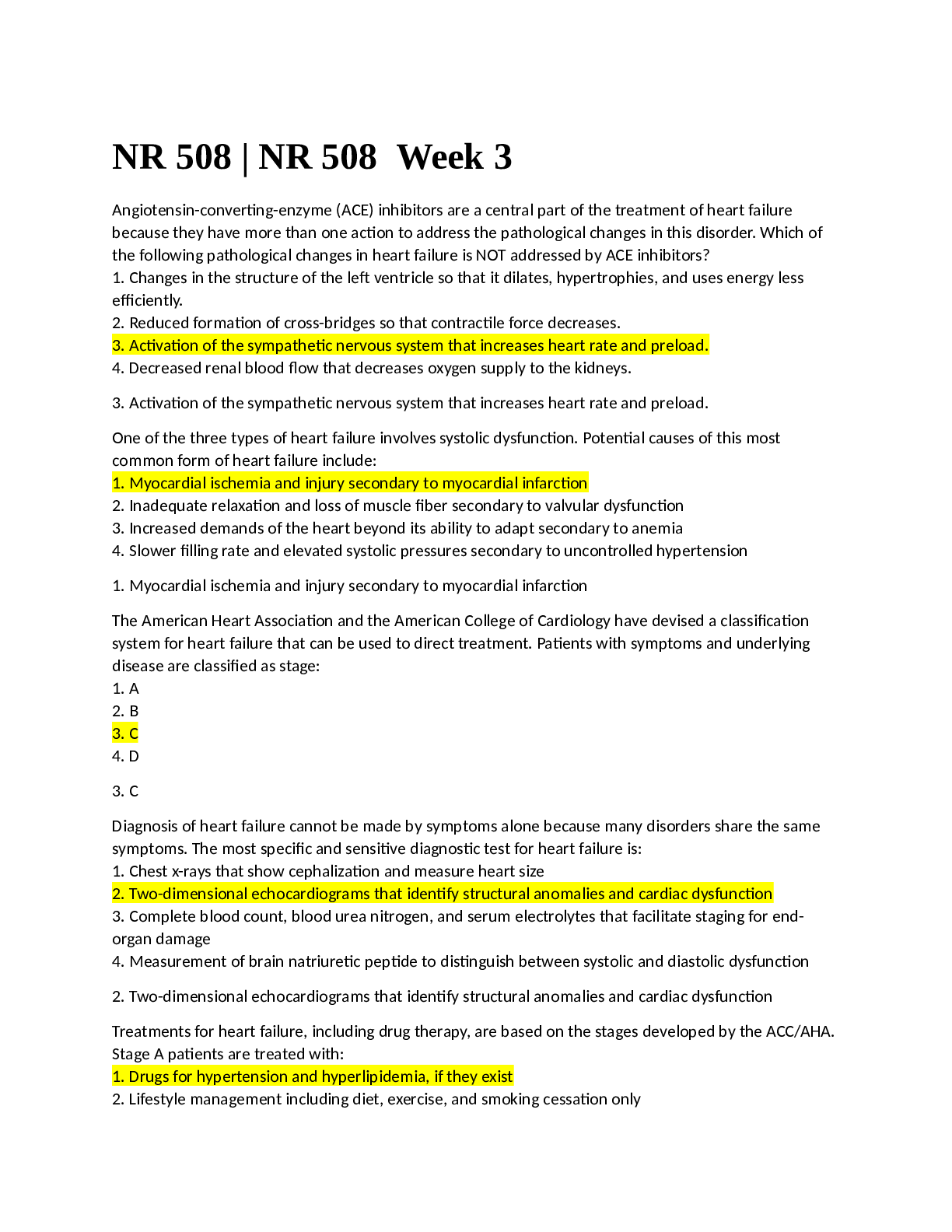
Buy this document to get the full access instantly
Instant Download Access after purchase
Add to cartInstant download
Reviews( 0 )
Document information
Connected school, study & course
About the document
Uploaded On
Oct 21, 2020
Number of pages
26
Written in
Additional information
This document has been written for:
Uploaded
Oct 21, 2020
Downloads
0
Views
52

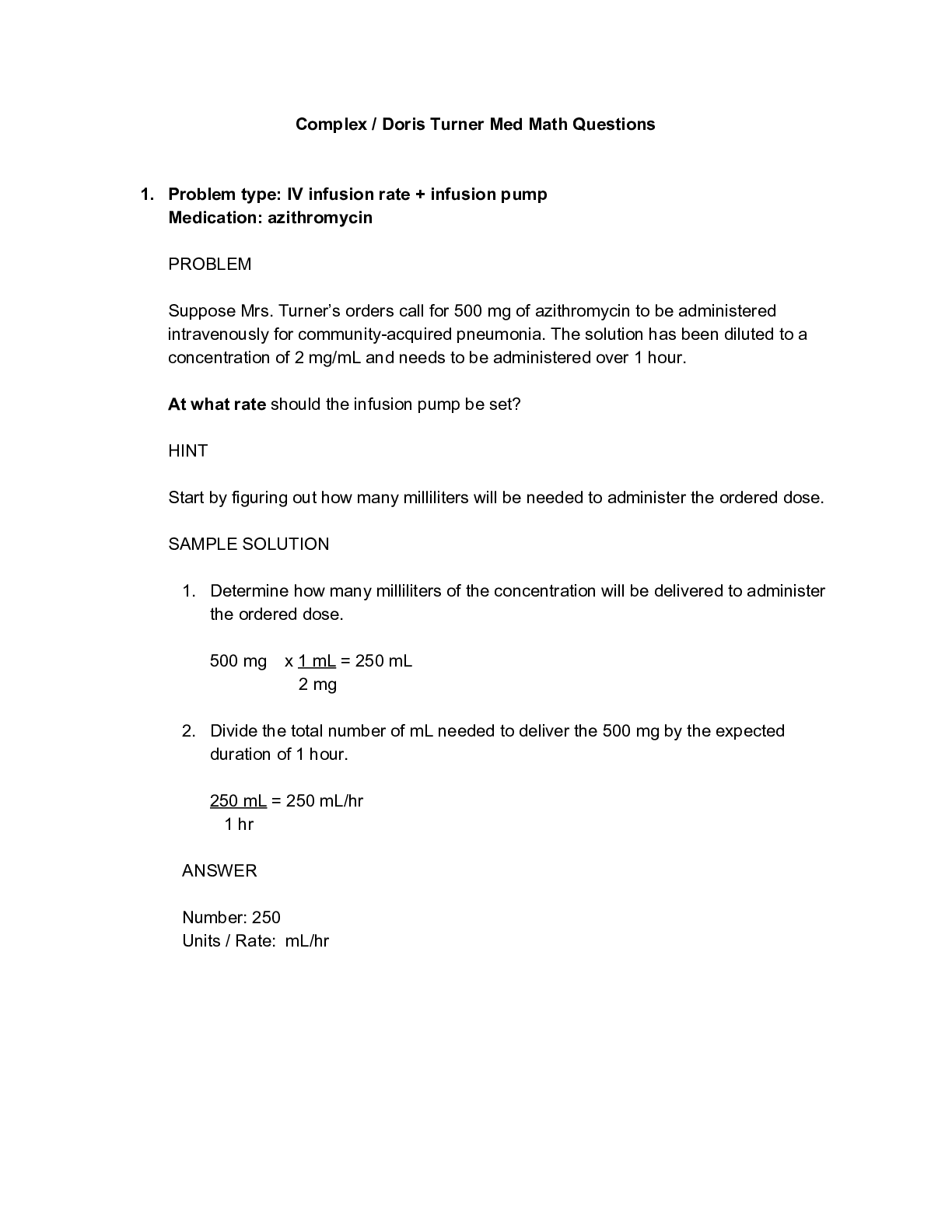

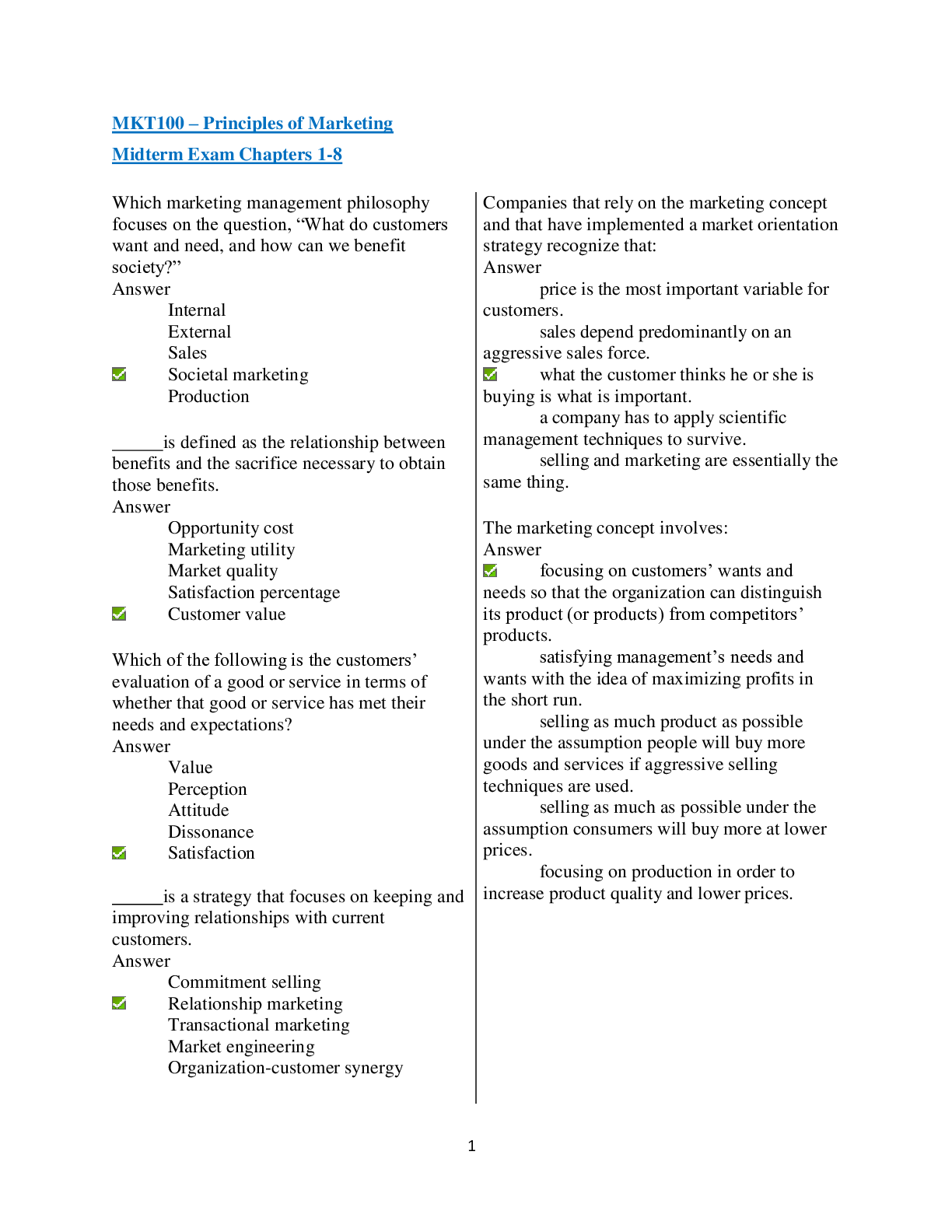



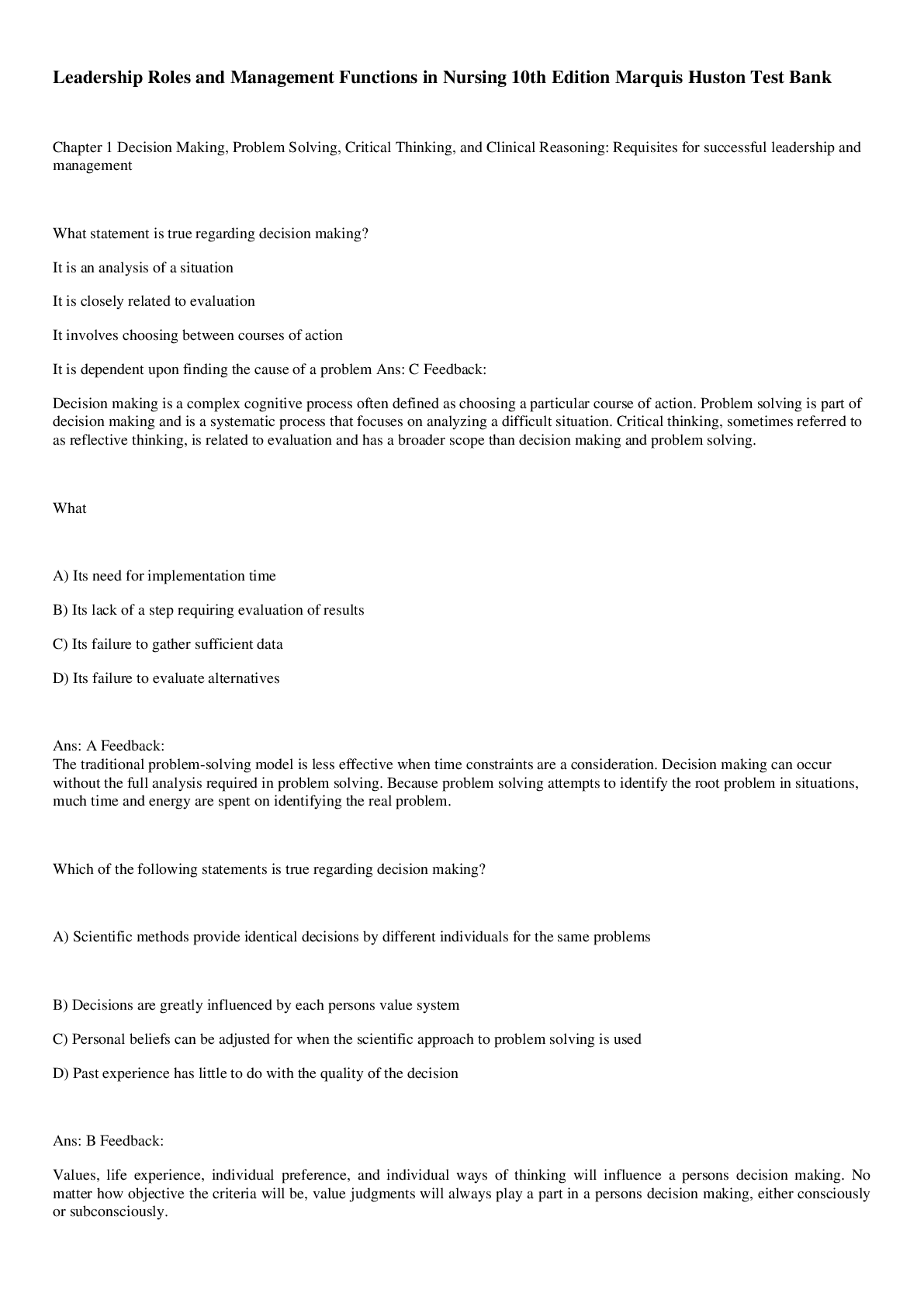

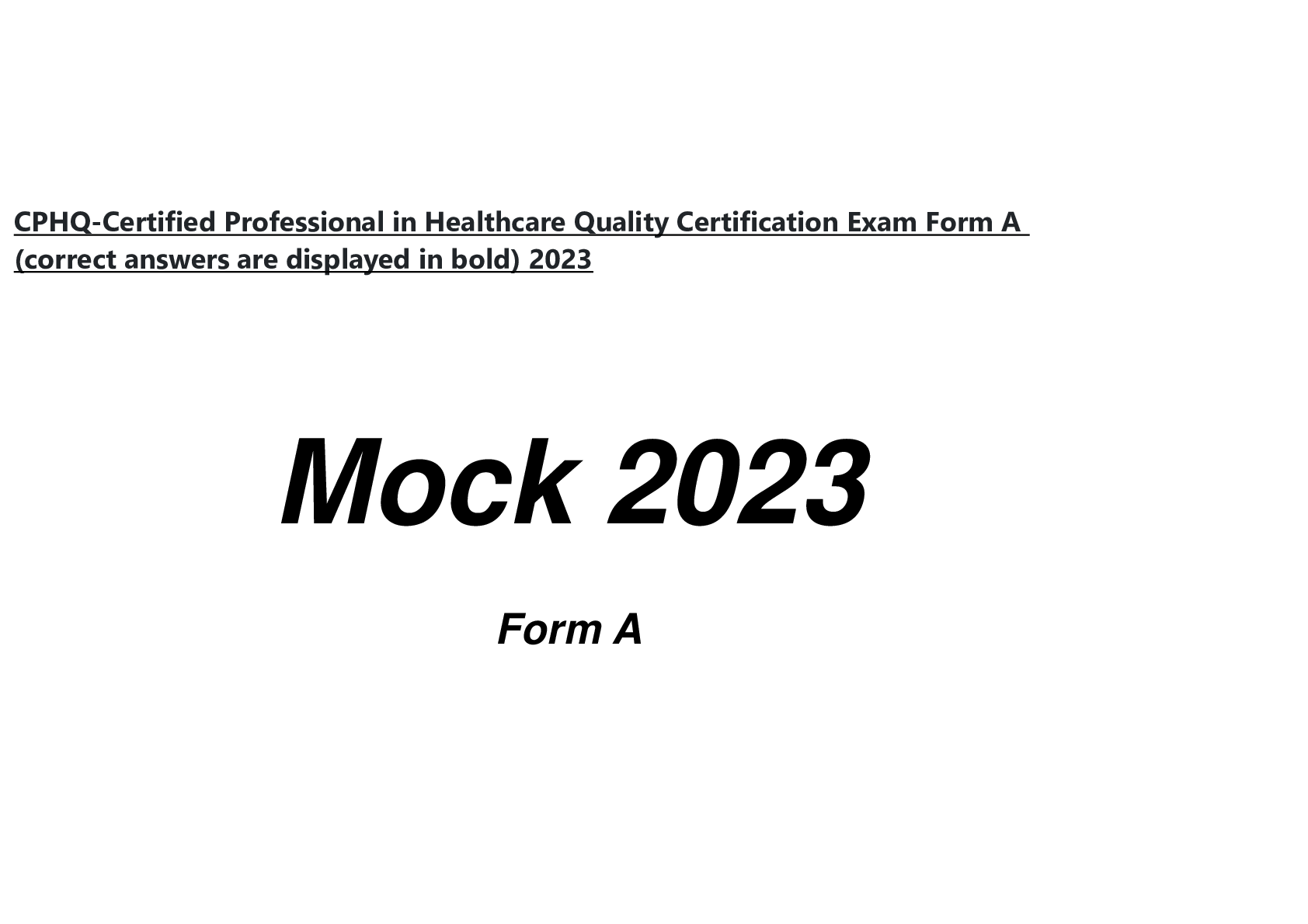
 (1).png)

